#New Wage Slavery
Text
youtube
hey listen to this song ok
114 notes
·
View notes
Video
youtube
End It - New Wage Slavery (Official Music Video)
20 notes
·
View notes
Text
youtube
More noise for yall: End It
Absolutely fell in love with this band after hearing this song and promptly went to listen their entire discography.
Please go check it out it is sooo good! my faves are this song, Familia Finito, B.C.H.C, Blind Faith, Wishlist, Apolitical
They are a band from Baltimore and make killer noise and I love it so much! 10/10
#fang writes to#i am obsessed with music#new noise#end it#new wage slavery#metal#political tunes#Youtube
2 notes
·
View notes
Text
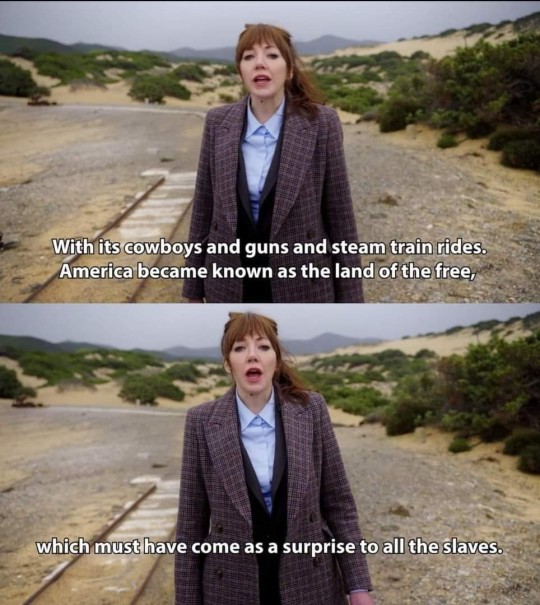
#usa#america#australia#australian#slavery#chattel slavery#us government#us govt#made in usa#usa news#united states#unitedstateofamerica#native american#amerikkka#amerika#wage slavery#ausgov#politas#auspol#tasgov#taspol#fuck neoliberals#neoliberal capitalism#anthony albanese#albanese government#land of the free#contradiction#contradictory#false statements#fraud
3K notes
·
View notes
Text
End It issue new track "New Wage Slaver" feat. Justice Tripp (Angel Du$t, Trapped Under Ice)
Band: End ItSong: “New Wage Slavery” feat. Justice Tripp (Angel Du$t, Trapped Under Ice)Album: Unpleasant Living EPRelease Date: July 8th, 2022Label: Flatspot Records
On the sentiment of the song, guitarist Ray Lee explains:
“The growing struggle between the ruling class and common people/citizens that becomes more apparent every day as we get fucked by those in power in this country and in the…

View On WordPress
0 notes
Text

You Must Obey Your Master
Know ye not, that to whom ye present yourselves as servants unto obedience, his servants ye are whom ye obey; whether of sin unto death, or of obedience unto righteousness?
— Romans 6:16 | American Standard Version (ASV)
The American Standard Version Bible is in the public domain.
Cross References: Genesis 4:7; John 8:34; Romans 6:13; Romans 6:20-21; Romans 6:23; Romans 11:2; Romans 12:1; 1 Corinthians 3:16; 1 Corinthians 5:6; 1 Corinthians 6;2-3; 1 Corinthians 6:9; 1 Corinthians 9:13; 1 Corinthians 9:24; 2 Peter 2:19
#wages of sin#slavery#death#obedience#righteousness#God#life#God's approval#servants#Romans 6:16#The Epistle of Romans#New Testament#ASV#American Standard Version Bible
5 notes
·
View notes
Text
Why And How Spirit Shields The New World Order
The New World Order that is Copiosis brings a powerful feature that prevents any disruption of benefits the system offers. Let's see what that feature is.
Photo by Omkar Jadhav on Unsplash
Whaddya know, this is the final part of our ten-part series on how Copiosis protects itself from despots. Haven’t read the other parts? Here’s part one.
If you have read every one, we think you now see how it’s impossible for someone to take over the New World Order. Once it’s running the deal’s done. That’s because Copiosis makes life great for everyone. Life…

View On WordPress
#alternative economic systems#alternatives to capitalism#copiosis#freedom#moneyless economy#New World Order#society without money#Ten-part series on despots#wage slave#wage slavery
0 notes
Text
Prison-tech company bribed jails to ban in-person visits
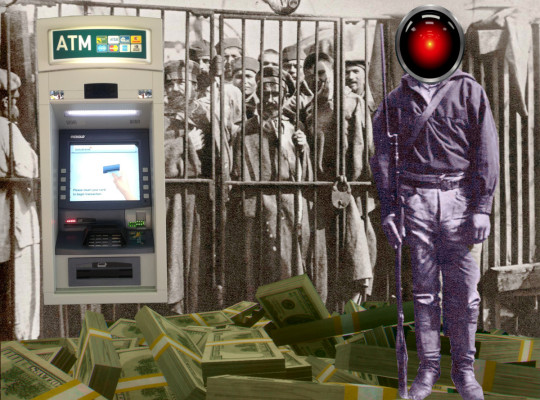
I'm on tour with my new, nationally bestselling novel The Bezzle! Catch me in BOSTON with Randall "XKCD" Munroe (Apr 11), then PROVIDENCE (Apr 12), and beyond!

Beware of geeks bearing gifts. When prison-tech companies started offering "free" tablets to America's vast army of prisoners, it set off alarm-bells for prison reform advocates – but not for the law-enforcement agencies that manage the great American carceral enterprise.
The pitch from these prison-tech companies was that they could cut the costs of locking people up while making jails and prisons safer. Hell, they'd even make life better for prisoners. And they'd do it for free!
These prison tablets would give every prisoner their own phone and their own video-conferencing terminal. They'd supply email, of course, and all the world's books, music, movies and games. Prisoners could maintain connections with the outside world, from family to continuing education. Sounds too good to be true, huh?
Here's the catch: all of these services are blisteringly expensive. Prisoners are accustomed to being gouged on phone calls – for years, prisons have done deals with private telcos that charge a fortune for prisoners' calls and split the take with prison administrators – but even by those standards, the calls you make on a tablet are still a ripoff.
Sure, there are some prisoners for whom money is no object – wealthy people who screwed up so bad they can't get bail and are stewing in a county lockup, along with the odd rich murderer or scammer serving a long bid. But most prisoners are poor. They start poor – the cops are more likely to arrest poor people than rich people, even for the same crime, and the poorer you are, the more likely you are to get convicted or be suckered into a plea bargain with a long sentence. State legislatures are easy to whip up into a froth about minimum sentences for shoplifters who steal $7 deodorant sticks, but they are wildly indifferent to the store owner's rampant wage-theft. Wage theft is by far the most costly form of property crime in America and it is almost entirely ignored:
https://www.theguardian.com/us-news/2023/jun/15/wage-theft-us-workers-employees
So America's prisons are heaving with its poorest citizens, and they're certainly not getting any richer while they're inside. While many prisoners hold jobs – prisoners produce $2b/year in goods and $9b/year in services – the average prison wage is $0.52/hour:
https://www.dollarsandsense.org/archives/2024/0324bowman.html
(In six states, prisoners get nothing; North Carolina law bans paying prisoners more than $1/day, the 13th Amendment to the US Constitution explicitly permits slavery – forced labor without pay – for prisoners.)
Likewise, prisoners' families are poor. They start poor – being poor is a strong correlate of being an American prisoner – and then one of their breadwinners is put behind bars, taking their income with them. The family savings go to paying a lawyer.
Prison-tech is a bet that these poor people, locked up and paid $1/day or less; or their families, deprived of an earner and in debt to a lawyer; will somehow come up with cash to pay $13 for a 20-minute phone call, $3 for an MP3, or double the Kindle price for an ebook.
How do you convince a prisoner earning $0.52/hour to spend $13 on a phone-call?
Well, for Securus and Viapath (AKA Global Tellink) – a pair of private equity backed prison monopolists who have swallowed nearly all their competitors – the answer was simple: they bribed prison officials to get rid of the prison phones.
Not just the phones, either: a pair of Michigan suits brought by the Civil Rights Corps accuse sheriffs and the state Department of Corrections of ending in-person visits in exchange for kickbacks from the money that prisoners' families would pay once the only way to reach their loved ones was over the "free" tablets:
https://arstechnica.com/tech-policy/2024/03/jails-banned-family-visits-to-make-more-money-on-video-calls-lawsuits-claim/
These two cases are just the tip of the iceberg; Civil Rights Corps says there are hundreds of jails and prisons where Securus and Viapath have struck similar corrupt bargains:
https://civilrightscorps.org/case/port-huron-michigan-right2hug/
And it's not just visits and calls. Prison-tech companies have convinced jails and prisons to eliminate mail and parcels. Letters to prisoners are scanned and delivered their tablets, at a price. Prisoners – and their loved ones – have to buy virtual "postage stamps" and pay one stamp per "page" of email. Scanned letters (say, hand-drawn birthday cards from your kids) cost several stamps:
https://pluralistic.net/2024/02/14/minnesota-nice/#shitty-technology-adoption-curve
Prisons and jails have also been convinced to eliminate their libraries and continuing education programs, and to get rid of TVs and recreational equipment. That way, prisoners will pay vastly inflated prices for streaming videos and DRM-locked music.
The icing on the cake? If the prison changes providers, all that data is wiped out – a prisoner serving decades of time will lose their music library, their kids' letters, the books they love. They can get some of that back – by working for $1/day – but the personal stuff? It's just gone.
Readers of my novels know all this. A prison-tech scam just like the one described in the Civil Rights Corps suits is at the center of my latest novel The Bezzle:
https://us.macmillan.com/books/9781250865878/thebezzle
Prison-tech has haunted me for years. At first, it was just the normal horror anyone with a shred of empathy would feel for prisoners and their families, captive customers for sadistic "businesses" that have figured out how to get the poorest, most desperate people in the country to make them billions. In the novel, I call prison-tech "a machine":
a million-armed robot whose every limb was tipped with a needle that sank itself into a different place on prisoners and their families and drew out a few more cc’s of blood.
But over time, that furious empathy gave way to dread. Prisoners are at the bottom of the shitty technology adoption curve. They endure the technological torments that haven't yet been sanded down on their bodies, normalized enough to impose them on people with a little more privilege and agency. I'm a long way up the curve from prisoners, but while the shitty technology curve may grind slow, it grinds fine:
https://pluralistic.net/2021/02/24/gwb-rumsfeld-monsters/#bossware
The future isn't here, it's just not evenly distributed. Prisoners are the ultimate early adopters of the technology that the richest, most powerful, most sadistic people in the country's corporate board-rooms would like to force us all to use.

If you'd like an essay-formatted version of this post to read or share, here's a link to it on pluralistic.net, my surveillance-free, ad-free, tracker-free blog:
https://pluralistic.net/2024/04/02/captive-customers/#guillotine-watch

Image:
Cryteria (modified)
https://commons.wikimedia.org/wiki/File:HAL9000.svg
CC BY 3.0
https://creativecommons.org/licenses/by/3.0/deed.en
--
Flying Logos
https://commons.wikimedia.org/wiki/File:Over_$1,000,000_dollars_in_USD_$100_bill_stacks.png
CC BY-SA 4.0
https://creativecommons.org/licenses/by-sa/4.0/deed.en
--
KGBO
https://commons.wikimedia.org/wiki/File:Suncorp_Bank_ATM.jpg
CC BY-SA 3.0
https://creativecommons.org/licenses/by-sa/3.0/deed.en
#pluralistic#prison#prison-tech#marty hench#the bezzle#securus#captive audiences#St Clair County#human rights#prisoners rights#viapath#gtl#global tellink#Genesee County#michigan#guillotine watch#carceral state#corruption
1K notes
·
View notes
Text
5 states including kentucky (!!) voted to protect abortion access. 3 states did away with slavery (prison labor) as punishment for a crime. 3 states made massive commitments to affordable housing. illinois made collective bargaining a protected right. 2 more states legalized weed. connecticut is moving towards early voting. alabama removed racist language from the state constitution and is investing in statewide public broadband internet. california massively expanded funding for arts and music programs in public schools. colorado raised on the wealthiest in order to provide universal free school lunch to students. georgia may no longer pay cops who are suspended on a felony indictment. massachusetts massively expanded funding for public education and infrastructure, massively expanded dental insurance, and will allow residents to get a drivers license or state id regardless of immigration status. montana will now require a search warrant for access to electronic data. nebraska will increase its minimum wage to $15. new mexico will massively improve and expand senior facilities, public libraries, higher ed, special public schools, and tribal schools, residential utilities (water, internet, electricity). new york is putting 4.2 billion towards climate change mitigation. rhode island is increasing funding for public education and environmental protection. south dakota expanded medicaid.
#there are good ballot measures still up in the air too#every news outlet is focusing on the party politics of it all#and that is important too#but tennessee voted to do away with slavery as punishment#and kentucky voted to defend abortion#and there are all these little things that are actually huge wins#across so many states#and SO much work goes into ballot measures#anyway
10K notes
·
View notes
Text
Let’s Adjust Federal Wages Without Forcing a $15/hour “Livable Wage”
“Inflation is at an all-time high” is the proclamation that several media outlets across the U.S. declare; and while that is true, one of many problems that comes with record-high inflation is that the federal minimum wage will remain the same; at $7.25/hour.
While it may not seem like a huge deal that the federal minimum wage, or any wages for that matter, fluctuate according to annual inflation; but the idea is that it should matter, and not only for our fellow Americans, but also our economy depends on it.
Let’s start from the beginning; inflation is defined as “a general increase in prices and a fall in the purchasing value of money”. Inflation usually happens when the purchase of goods out-paces the production and shipment of those goods. To stall the continued purchasing, the companies increase the prices to slow down the consumers. This allows for businesses and companies to stock up on their goods and/or ship them out to help meet the demand.
Inflation is usually a normal cycle in the business world; prices go up and down with the economy every year. However, inflation can also increase to the point of becoming a threat to the economy and consumers. For example, the cost of living; which is the cost for the maintenance of a standard of living, is something that fluctuates with the economy because of housing markets, apartment rentals, the price of food and other necessities that are in demand by consumers. The cost of living depends on the wages that consumers bring in every month, and if prices get too high and consumers aren’t making enough to get by, then they’ll find themselves in poverty; or worse, homeless and jobless.
On July 24, 2009 the United States Congress increased the federal minimum wage from $5.15/hour to $7.25/hour as part of President George W. Bush’s Fair Minimum Wage Act of 2007; which increased the federal minimum wage in 3 increments ($5.85/hour 60 days after enactment, $6.55/hour a year later, and $7.25/hour two years later). This would be the last time that a sitting President successfully increased the federal minimum wage. From July 24, 2009 to this day, the federal minimum wage remained at $7.25/hour, and the inflation rate from 2009 to 2021 rose to 5.06% with an average of 0.87% per year.
These numbers don’t tell us everything, however, and in order to fully understand how inflation has impacted the federal minimum wage and the cost of living; we’re going to need to apply purchasing power to these percentages and numbers.
Have you ever heard stories from elders about how cheaper items used to be “back in the day”? That’s because, over the years, inflation has reduced the purchasing power of the dollar; which means $1 today doesn’t buy as much as it used to back then. For example, if you bought $5 worth of consumer products back in 2000; those same items would cost $7.90 in 2021 due to the decreasing value of the dollar from inflation. This means that the cost of living increases while the minimum wage has stayed the same for 13 years.
To make a long story short; $7.25 in 2009 has the same purchasing power as $9.36 today. We don’t have to increase the minimum wage to a crazy $15/hour, but we should at least adjust wages according to annual inflationary purchasing power; because right now about 38% of Americans are currently in poverty, and 5% of those families are earning $16/hour (which in today’s economy should be $20.28 according to the CPI)
0 notes
Text
“By 1900 child mortality was already declining—not because of anything the medical profession had accomplished, but because of general improvements in sanitation and nutrition. Meanwhile the birthrate had dropped to an average of about three and a half; women expected each baby to live and were already taking measures to prevent more than the desired number of pregnancies. From a strictly biological standpoint then, children were beginning to come into their own.
Economic changes too pushed the child into sudden prominence at the turn of the century. Those fabled, pre-industrial children who were "seen, but not heard," were, most of the time, hard at work—weeding, sewing, fetching water and kindling, feeding the animals, watching the baby. Today, a four-year-old who can tie his or her own shoes is impressive. In colonial times, four-year-old girls knitted stockings and mittens and could produce intricate embroidery; at age six they spun wool. A good, industrious little girl was called "Mrs." instead of "Miss" in appreciation of her contribution to the family economy: she was not, strictly speaking, a child.
But when production left the houschold, sweeping away the dozens of chores which had filled the child's day, childhood began to stand out as a distinct and fascinating phase of life. It was as if the late Victorian imagination, still unsettled by Darwin's apes, suddenly looked down and discovered, right at knee-level, the evolutionary missing link. Here was the pristine innocence which adult men romanticized, and of course, here, in miniature, was the future which today's adult men could not hope to enter in person. In the child lay the key to the control of human evolution. Its habits, its pastimes, its companions were no longer trivial matters, but issues of gravest importance to the entire species.
This sudden fascination with the child came at a time in American history when child abuse—in the most literal and physical sense���was becoming an institutional feature of the expanding industrial economy. Near the turn of the century, an estimated 2,250,000 American children under fifteen were full-time laborers—in coal mines, glass factories, textile mills, canning factories, in the cigar industry, and in the homes of the wealthy—in short, wherever cheap and docile labor could be used. There can be no comparison between the conditions of work for a farm child (who was also in most cases a beloved family member) and the conditions of work for industrial child laborers. Four-year-olds worked sixteen-hour days sorting beads or rolling cigars in New York City tenements; five-year-old girls worked the night shift in southern cotton mills.
So long as enough girls can be kept working, and only a few of them faint, the mills are kept going; but when faintings are so many and so frequent that it does not pay to keep going, the mills are closed.
These children grew up hunched and rickety, sometimes blinded by fine work or the intense heat of furnaces, lungs ruined by coal dust or cotton dust—when they grew up at all. Not for them the "century of the child," or childhood in any form:
The golf links lie so near the mill
That almost every day
The laboring children can look out
And see the men at play.
Child labor had its ideological defenders: educational philosophers who extolled the lessons of factory discipline, the Catholic hierarchy which argued that it was a father's patriarchal right to dispose of his children's labor, and of course the mill owners themselves. But for the reform-oriented, middle-class citizen the spectacle of machines tearing at baby flesh, of factories sucking in files of hunched-over children each morning, inspired not only public indignation, but a kind of personal horror. Here was the ultimate "rationalization" contained in the logic of the Market: all members of the family reduced alike to wage slavery, all human relations, including the most ancient and intimate, dissolved in the cash nexus. Who could refute the logic of it? There was no rationale (within the terms of the Market) for supporting idle, dependent children. There were no ties of economic self-interest to preserve the family. Child labor represented a long step toward that ultimate "anti-utopia" which always seemed to be germinating in capitalist development: a world engorged by the Market, a world without love.”
-Barbara Ehrenreich and Deirdre English, For Her Own Good: 150 Years of the Experts’ Advice to Women
525 notes
·
View notes
Text
What "The Hidden Fortress" (1958) tells us about the Jedi's status in the Prequels.
In 1999, George Lucas had this to say on BBC Omnibus: A Long Time Ago: The Story of "Star Wars" and then The Phantom Menace's director's commentary.
“I greatly admired Kurosawa, especially the film Hidden Fortress, which told a story from the point of view of two serfs, two slaves...
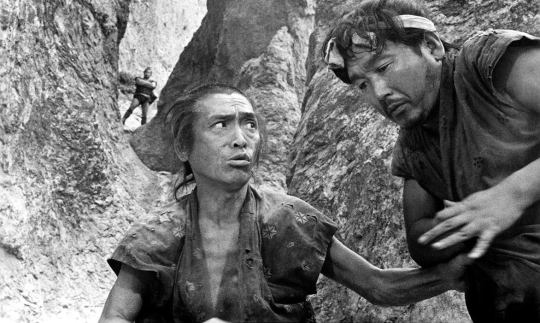
... peasants who tag along with this famous general and a princess-- y'know, royalty. And the whole story is told from their point of view. And I like that idea.
I like the idea of telling a story from the lowest person's point of view, uh, in the food chain, and that's how the story got to be told by Artoo and Threepio.”

“[The Phantom Menace] is told primarily from the Jedi's point of view, but the story that's being told is essentially the story of Queen Amidala and her plight of having her planet blockaded. As in, say, Episode IV, where the story is told through the eyes of the droids, in this one, it's told through the eyes of the Jedi.”

“But [from the moment we get to Coruscant, Anakin and Jar Jar] are standing on the sidelines. It's a little bit a riff on the very first film where the story is told through the point of view of the droids, who were sort of the lowliest characters.”

“And in [Phantom Menace], I'm doing it through - primarily - the two Jedi, but then the secondary characters are also carrying a lot of the weight when the Jedi aren't around.”
George Lucas draws a comparison between lowly characters like Hidden Fortress' peasants Matashichi and Tahei, the droids in A New Hope, as well as the Jedi in The Phantom Menace.
What do they all have in common? They are all the lowest-ranking characters in their respective films. Repeat: the movie frames the Jedi as almost at the bottom of the food chain.
Because of course they are. Functionally, they're just diplomats. They hold no political power whatsoever and barely have any authority .
What little authority the Jedi do have in TPM comes from the Queen's young age, which allows them to ease into a more advisory position, and Qui-Gon's rebellious streak. And even he's explicit about the fact that his mandate has limitations.

The only characters "below" them in status are Jar Jar, an exiled Gungan, and Anakin, who just yesterday was still a slave kid, Artoo the literal object and that's it!
Also the other Prequel films are consistent with this portrayal. Who do we see lower in status than the Jedi? Dexxter Jettster and the clones. Everyone else is pretty much above them.
Yes, the Jedi are part of the system, but they're not as high-ranking as you'd think. Yes, they have Force Powers, but that means squat when put against political power. So, like, to expect the Jedi to...
influence the decisions of the Senate,
wage a war against the Outer Rim to end slavery,
or blatantly refuse an order to join the war effort,
... is incredibly unreasonable.
They're not meant to be seen as "the elite, peering down upon the people from their ivory tower".
They're the servants! Servants of the Republic.
And they're seeing their higher-ups destroy what they should all stand for, but are unable to stop them.
Later on, with The Clone Wars, we are introduced to civilian characters and from their point of view, the Jedi are ultra powerful and are highly placed and "should do more but don't".
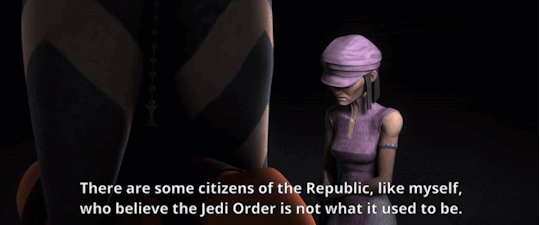

It makes sense that these characters would see the Jedi as 'the elite'. But they don't have the full picture.
We, as the audience, do.
So we know that the reality is more along the lines of the Jedi "should do more but can't".
After all, we are made privy many instances of the Jedi speaking up and trying to change politicians' minds, only to be dismissed and overruled at every turn.


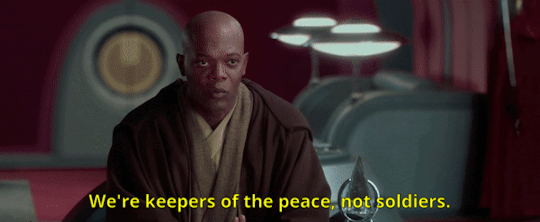










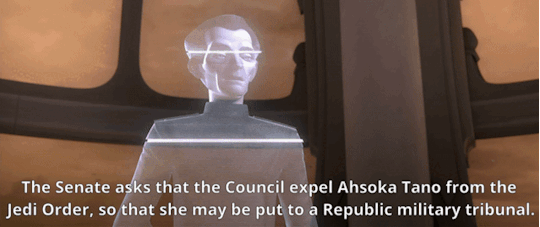




↑ these aren't even all the times we see it happen, btw, there's more examples...
So at some point, if you - as an audience member - see all this and are still saying "the Jedi should've done more!" I really need to know... what more could they have done?
Take control of the Senate?

That'll result in a dictatorship, there's a reason they waited as much as they did before trying to take down Palpatine.
Power corrupts and they're wise enough to know it.
Don't join the Republic in the first place?
George Lucas never frames the Jedi's involvement with the Republic as a bad thing. In the foreword to Shatterpoint (2004), he says their being part of the Republic led to 1,000 years of prosperity.
Where's the issue, then? Well, it's a two-man job and the Jedi's bosses, the Senate, grew corrupt and stopped doing their part. They stopped carrying their end of the couch.
But “no Jedi in the Republic from the get-go” means the Sith will rise to power even faster. Fun!
Stay neutral in the war?
The Separatists were killing civilians and testing weapons on neutral systems, or enslaving them.


The choice put before the Jedi was "do what we tell you and fight, or let people die".
But also, out-of-universe... do you really think Palpatine, genius politician, master of spin, can't re-frame the Jedi staying neutral in a negative light?
When they joined the war, he unleashed propaganda that either directly (on the Separatist side) or indirectly (on the Republic side) framed them as "warmongers who corrupted their values". If they don't join, they're "apathetic cowards who care more about their own values than the lives of the people they're supposed to protect".
So either way, Order 66 comes around, wipes them out and the Republic goes "good riddance".

So what else could they do?
The answer is "not much".
Because the whole point of the narrative is that Palpatine checkmated them by taking the fight to a field the Jedi had no experience in or right to meddle with: politics.
So if you look at these characters who are nowhere near the top of the food chain, and say "well, why didn't they fix things?" I'm sorry to say you're missing the point of the narrative.
Or maybe you do get the point of the narrative and just aren't trying to be fair...

... in which case, at least be consistent and also argue:
"Why didn't Threepio & Artoo do more to save the Rebel crew of the Tantive IV from the stormtrooopers?!"
"Why didn't Matashichi & Tahei do more to save the Akizuki clan?!"
#HINT: the answer to both those rhetorical questions is “there was nothing they could do”#Also while we're on 'Hidden Fortress' - it's also worth pointing out that Qui-Gon and Padmé's dynamic on Tatooine in TPM#is very similar to the dynamic of General Rokurota and Princess Yuki in 'Hidden Fortress'.#The older warrior looking after the royalty teenage girl who is dressed as a peasant so as to not draw attention because she's on the run.#The Hidden Fortress#Akira Kurosawa#George Lucas#Artoo#Threepio#c3po#r2d2#lucas quotes#meta#on the jedi's involvement in the clone wars#in defense of the jedi#jedi order#qui-gon jinn#the phantom menace#star wars#long post
815 notes
·
View notes
Text
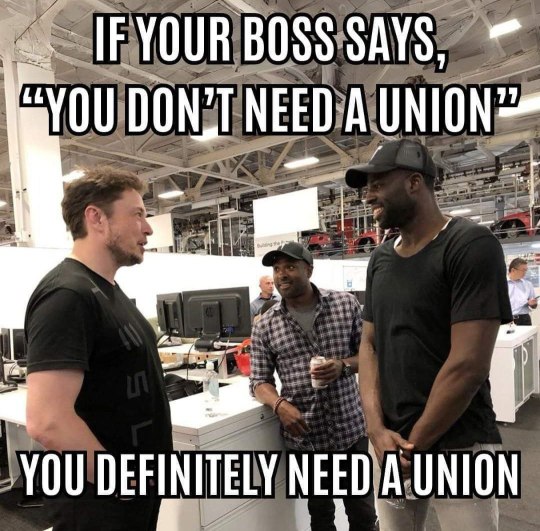
#anti slavery#wage slavery#chattel slavery#slavery#unions#union strong#labor unions#union#class war#helluva boss#subway boss ingo#subway boss emmet#boss#poverty#workers rights#workers rise up#worker solidarity#workers solidarity#sex worker#horror moment customers attack worker over iphone 15 pro delay as new phone launch sparks buying frenzy across india#four workers killed after lift collapses in high rise building under construction in noida#workers of the world unite#ausgov#politas#auspol#tasgov#taspol#australia#fuck neoliberals#neoliberal capitalism
228 notes
·
View notes
Text
Caged Part Two
(I am currently in a situation where I cannot get pics for the stories. This will hopefully be fixed soon.
This is also a part two of a series, part one can be found here. Reminder, this is a slow burn.
CW: Slavery, but the reader is trying to change/dismantle it in their own way.
Previously: The listener visited a slave market and is now trying to destroy the slavery market by making them pay for run away slaves, but the Lionman they bought may need more than a quick release to truly get their freedom.
"Six days a week, off by the seventeenth mark. The Holy Day you will have off. If you want to go into town during that time, I would suggest an escort." You looked up from the contract, notes jotted on a scrap pieces of paper.
"Since I am your personal property--" Areus began.
"Servant!" You insisted through clenched teeth, cutting him off. "Father and I do not keep slaves."
Your pen flicked across the paper, leaving a few fat drops of ink on the pages.
"Our servants have rights and wages that are livable." You tried to keep your composure and continued to go over the terms written down in front of you. "Six coppers a week to spend as you wish."
You would have to double check the figures, but that seemed right.
"Which, with your diligence bonus, comes to one silver a month, an extra as a present on the Four Season holidays." Maiden Spring, Bride Summer, Mother Autumn and Widow Winter. "With twenty-five silver to one gold, you will be free in just under two cycles."
"If I save all the money I earn." The lionman nodded sagely, fingers laced together. There were scars around the tips of his fingers. The papers declared him "declawed for your protection" and his fangs filed down. No wonder he was nervous.
"Most of your needs will be taken care of." You explained, the hair on the back of your neck standing up. "Food. Clothes. Residence in the servants quarters. Your wages will increase."
"Because I've paid off the debt?" He stared at the contract, tilting his head to try and look at the contract.
"Seniority." You passed it over to him. "The highest paid maid makes five silver a month."
He pondered the words with a furrowed brow and frown. His hands clasped tightly, before he let out his breath.
"If I am your servant, I should be awake and working while you do."
"That would be over twelve marks. You would have no time to yourself."
"I will have Holy Day." He said it almost like he was speaking to a child, before wincing at his tone.
Something told you he wasn't going to concede. You rubbed your palm against your brow. Two mark candles had burned out already. The Notary had gone home, leaving you to do the heaving lifting.
"If you work more than the allotted eleven marks, then you will receive a diligence bonus." You too the contract back and signed the bottom of the contract. "A slightly higher pay. You may earn up to twelve coppers a week and two silvers a month."
"Very well..." He rumbled out the words.
Yeesh, I'm the master but it feels more like he's in charge!
"May I go clean myself off?" He rested his palms on the table.
"Of course, Areus. Apologies for not letting you get to it earlier. I will prepare a nightgown for you tonight. We've sent for a tailor to get your clothing in order."
He stood and made his way to the servants bathing chambers. Long empty thanks to the others getting off on time, he seemed relieved to be alone. Without another word, he closed the door behind him.
Gathering the papers, you sighed in relief. Now you would just have to get used to the new addition to the staff. One gold coin was your father's blessing each month. You'd have to run down and get the appropriate change soon, to properly pay the creature.
Snuffing out the remaining candle, you offered a quick prayer to the Maiden. The symbol of new beginnings and hopefully one that would nurture into something fruitful. Perhaps the Bride to celebrate the new union.
Although this was the start of a master/servant relationship rather than a Holy Union. Bothering her could bring sourness upon the whole arrangement.
Nothing like a Day with Rain to get this into even more of a mess...
Sucking in a breath, you licked your fingers and snuffed out the incense. Closing the Goddess' sight should only be done through pain.
You were finishing putting away the writing supplies when you noticed Areus hadn't signed his name on the bottom of the contract.
Then, a thought struck you. Could he even read or write?
Going up to the door, you listened for splashing. When there was none, you reached a fist up to knock.
Only to hear weeping.
"Areus!?" You called out.
The weeping stopped with some loud sniffling.
"Master?"
Sighing, you considered opening the door. But to have a servant and noble found in such a position... The rumors would spread faster than lamp oil and fire.
"What's the matter?"
Silence answered.
"Areus?"
"My name is one of my many vanities. They ruined it by not letting me care for it. It's all matted, the filth all the way down to my scalp. I fear the only way to release it is to take a razor to the hair."
Frowning, you thought about the implications. A lionman without a mane could make him a target. Humiliations or beatings... It didn't matter.
"Is that all?" You tried to keep your voice from shaking. "I may have some hair ointments that could release it."
"Oh, Master, I could never-"
"Consider it part of your diligence bonus." You opened the door, coughing as all the steam hit you. "Come with me to my chambers. It's not bed time yet."
To be continued...
#monster love#monster lover#monster romance#monster x human#monster boyfriend#monster fucker#monsterfucker#lionman#fantasy writing#fantasy world building
68 notes
·
View notes
Text
A United Nations official on Wednesday denounced Canada's temporary foreign worker program as a "breeding ground for contemporary forms of slavery."
Tomoya Obokata, UN special rapporteur on contemporary forms of slavery, made the comments in Ottawa after spending 14 days in Canada.
"I am disturbed by the fact that many migrant workers are exploited and abused in this country," he said.
"Agricultural and low-wage streams of the temporary foreign workers program constitute a breeding ground for contemporary forms of slavery."
Obokata's comments echo those of Jamaican migrant workers who, in an open letter to their country's ministry of labour last month, described their working conditions in Ontario as "systematic slavery."
Continue Reading.
Tagging: @politicsofcanada
218 notes
·
View notes
Text
How Redefined Families Powerfully Protect The New World Order
The family: a breeding ground for maladjusted adult children. Here's how the New World Order addresses that, thereby protecting itself from such people.
Photo by Museums Victoria on Unsplash
Holy smokes! We’re near the end of our ten-part series on ways Copiosis protects itself from despots. Using the system to negatively control others is very hard. Many safeguards prevent that. Almost all of them are positive “carrots”. They’re also very subtle. In other words, they don’t occur as manipulations. Instead, they just feel good.
Feeling good…

View On WordPress
#alternative economic systems#alternatives to capitalism#copiosis#family is the foundation#focus on the family#gift economy#moneyless economy#New World Order#society without money#wage slave#wage slavery
1 note
·
View note